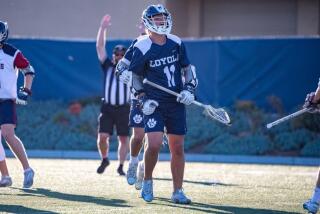They Have Priorities in Order
- Share via
Every so often, coaches, parents and athletes need to be reminded why high school sports exist.
They were created to provide athletic competition among teenagers, to test physical and mental toughness and to teach life lessons that can’t be learned by watching television.
However, some still believe high school sports are mostly about winning championships or earning athletic scholarships. That’s what parents care about, what many athletes talk about and what sportswriters write about.
But the truth is the vast majority of participants don’t win titles or receive college scholarships, making their motives for playing all the more admirable.
The positive attributes of high school sports are supposed to rub off on participants, and there are plenty of examples.
Juan Carlos Olivares, a senior volleyball player at Los Angeles Cathedral, has known since he was a sophomore that he had little chance of earning an athletic scholarship. It didn’t deter him from playing sports or finding another way to college -- through academics.
He has been accepted at Yale and will become the first member of his family to attend college. He wants to become a lawyer. He lives in East Los Angeles and is the oldest of four boys. His father owns a lunch truck and his mother is a cook.
He could use his volleyball practice time for studying, since he’s taking five Advanced Placement classes, but he wouldn’t consider giving up his sport.
“It fits in with the whole high school experience,” he said. “Academics is important, but you’ve got to have something else. It’s fun to go every day after school for two hours and just play.”
There are four other seniors on Cathedral’s volleyball team who are headed to four-year schools thanks to their academics: Juan Hermosillo and Francisco Sanchez to UCLA, Ivan Gutierrez to Oregon State and Rene Jovel to Northwestern.
Coach Michael Godoy, whose team finished second in the Del Rey League and begins the Southern Section Division IV playoffs this week, appreciates the priorities and dedication of his scholar-athletes.
“They’re using volleyball as their outlet to escape the pressure of the academic world,” he said.
Andrew Platt, a swimmer and water polo player at Beverly Hills, is involved in so many endeavors that you have to wonder when he has time to sleep.
He sings in the advanced choir, works two days a week at Cedars-Sinai Medical Center as a research assistant, plays the flute, had a lead role in the school production of “Bye Bye Birdie” and has a 4.8 grade-point average.
And yet, he believes he has devoted more time to swimming and water polo than studying, even though he’s not going to receive an athletic scholarship.
“I don’t do it because I have to,” he said. “I do it because I want to. I was always an OK swimmer. Then, when I played water polo, I fell in love with it.”
Platt will attend USC in the fall and be part of a special six-year program that allows him admission to the medical school. He wants to become a neurosurgeon.
Then there’s Ryan Lavarnway, batting .478 with six home runs as a starting outfielder at Woodland Hills El Camino Real. He has a 4.1 GPA, is headed to Yale and wants to become a politician. He understands the reasons for high school sports.
“Learning how to deal with failure,” he said. “Teamwork, camaraderie, learning to come through in the clutch. The championships and the sports scholarships are the guts and glory. That’s what we all talk about because that’s what a lot of people strive for.
“But in reality, that’s not the main thing that happens. You learn about yourself, what you can and cannot do. You learn about life and become a better person.”
The next time a coach yells at a referee, a parent tries to have a coach fired for not winning enough games or an athlete complains about not getting enough interest from college scouts, remind them of the most important reasons that high school sports exist.
Eric Sondheimer can be reached at eric.sondheimer@latimes.com.
More to Read
Get our high school sports newsletter
Prep Rally is devoted to the SoCal high school sports experience, bringing you scores, stories and a behind-the-scenes look at what makes prep sports so popular.
You may occasionally receive promotional content from the Los Angeles Times.







